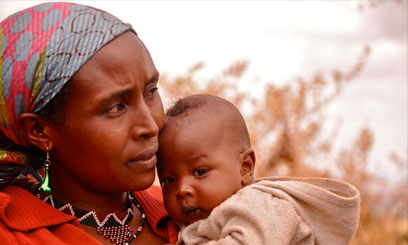MARSABIT, Kenya, Jun 27 – Hadadal Tiy has just been blessed with twins, but barely two hours after receiving the bundles of joy, raiders attack her village.
Everyone scampers to safety. Only the new mother and her crying twins are left behind.
These are the sad, unbelievable realities of the struggle by the women in Northern Kenya. If you talk of strength of a woman, the women of Marsabit must be among the strongest.
There is a story behind almost every child. They were either born at home, by the road side or in hospital after long hours of travel.
The innocence on the faces of these children is probably the appreciation that they miraculously survived at birth.
Mortality rates in Marsabit have remained high with estimates of 47 out of 1,000 infants dying annually.
Halima Dida is a mother of four. On her way to the hospital during her latest pregnancy, she went into labour. Regrettably the vehicle they had hired broke down and their journey was cut short in the middle of a forest. She delivered right there, in the middle of nowhere.
Kule Doti of Huqa Qalla Manyatta gave birth at home in February this year. She did not bother trying to go to hospital.
“I gave birth at home, the road is bad. The transport is too expensive, if I use a vehicle I have to pay Sh4,000 and when I go to hospital I have to pay Sh700. so I better give birth at home,” she explains.
Abadaso Manyai got her baby in March this year. Her story is the same as that of Doti. She also did not bother to go to hospital to deliver.
“From where I live I have to pay the lorry driver Sh2, 000. The road is so bad that for someone who is almost delivering it is too bumpy. Instead of taking such a risk of traveling on such a road, I would rather give birth at home. Besides, I cannot even afford all that money,” she said.
Galgalo, a clinical officer in Marsabit has been trained to midwife births in hospital. However, his own daughter Sare was also born by the roadside as his wife went into labour on their way to hospital six years ago.
In Borana, Sare means a dog.
The father chose this name because of the hardships and the discrimination he faced being handicapped and having his daughter born on the road despite him being a clinical officer.
“Sare was born by the road side. We were taking my wife to hospital,” Galgalo explains as he holds his daughter next to him but smiling at the name Sare.
Galgalo who closely works with women in Marsabit explains that they give birth at home due to lack of public transport, bad roads and insecurity in the area.
“There are many problems, but the main ones are that here most people are poor, they do not have finances to go to hospital. They also cannot afford to hire a taxi. The roads are terrible. From here one has to cover about 10 kilometres,” he explains.
All these women would have wished to go to hospital to deliver. But poor roads and insecurity are the major reasons why public transport is not available in the area.
A taxi to the hospital charges between Sh2, 000 and Sh4, 000.
Capital FM News’ attempts to secure an interview with the Ministry of Roads were futile despite many phone calls and text messages to the Public Relations Officer.
In a text message, the Public Relations Officer in the Ministry said the Minister was too busy: ‘Sorry, I didn’t get back. Waziri’s (Minister’s) schedule is tight’.










































